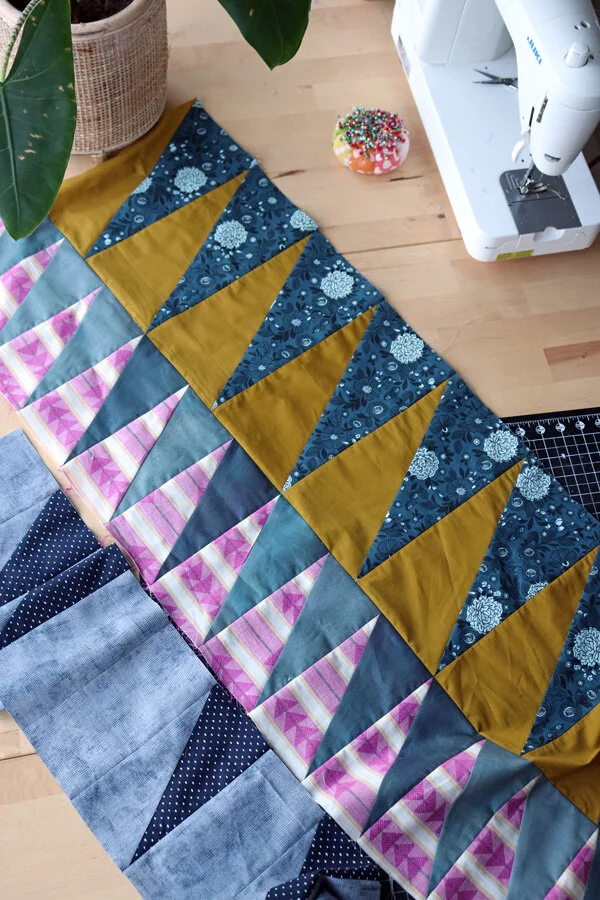After the Rain: Choosing Fabrics
This is another post in the After-the-Rain sew-along series. Find the details and master post list here.
In comparison to many of my quilt designs, After the Rain uses relatively few fabrics. Each column features a pair of fabrics in a series of identical half rectangle triangle blocks. Repetition creates a strong, bold feeling.
That’s why this time we’ll spend more time thinking about your fabric choices. The fewer the fabrics, the greater their individual impact.
Now, don’t be afraid! This is a chance to show off some fabrics that you really love. I have some tips today (and a fun surprise) to help you make good choices.
Fabric Elements
Solids or Near Solids. Consider quilting cotton solids and shot cotton, plus near solids like ombre and textures. These keep the quilt feeling modern and sharp.
1-2 Bright Colors. After the Rain requires both dark and light fabrics. I’ve always used black and cream, for example. But also consider some bright colors like jade, turquoise, pink or curry. A pop or two of bright colors keeps it from feeling too dull.
Scale. This is a quilt pattern that actually works well for those large scale prints you love! Generally save small scale prints for the small size blocks. They can look dwarfed in the larger blocks. Use a mix of scales, including 1-2 large scale prints.
Linear Prints. I’m a fan of using linear prints like stripes and plaids in this quilt. I like how they contrast with the dramatic slanting triangles. I also like how they won’t line up between the blocks, creating a feeling of off-kilter irregularly - just like life.
Check Directionality. Some directional prints like birds or houses only have one orientation that is right side up. The After the Rain pattern has you cut 2 triangles from one large rectangle. As a result, one triangle will have right-side-up elements and the other will be upside down. To avoid this problem, skip this sort of directional print. Alternatively, you can decide that upside down prints aren’t a problem! Or, buy twice the fabric as suggested so that all your birds, houses or whatever can be right side up.
Fabric Placement
My process usually begins with choosing a group of fabrics. Next I think about where I would use them in the quilt, and thus what cuts to buy of each. If you are working with fabric from your stash, you’ll obviously be limited by the amount of yardage you have on hand.
Reference page 8 in the After the Rain quilt pattern. This quilt map gives you a birds eye view and helps you sort out where the color values fall. Deciding which fabrics to use in each block is a process of trial and error. Don’t know where to start? Here are two approaches:
First choose fabrics for column 4, which are the large blocks, and then choose fabrics for the medium blocks. Consider using your large scale prints or your very favorite fabrics, as these blocks get the most attention. Then, fill in the rest of the quilt using the value suggestions on the quilt map as a guideline.
OR
Start by placing your darkest and lightest fabrics, as per the quilt map. Next fill in the rest of the quilt, following the value suggestions and working toward medium value fabrics. This is a good approach if you wish to closely follow the quilt map value placement.
If you have your fabrics on hand, arrange them in column order as light/dark pairs. How do your fabrics flow? Are you pleased with the distribution of color?
Would you like some help visualizing your plans? I have a fun surprise for you! I’ve created a free digital coloring sheet via PreQuilt! You can use the color sheet to easily try out your colors. Choose a representative color swatch for each of your fabrics and watch the quilt transform before your eyes. It’s super fun!
By the way, there is an option to populate the digital color sheet with digital fabric swatches, instead of solid colors. This is available with the paid plan. I decided to give it a whirl. In fact, I couldn’t resist planning several quilts! I’ll show you my ideas later this week and the PreQuilt design of the quilt I’ll actually be sewing for Liz.
Pssst - a very limited number of fabric kits will be available! Keep an eye out for my next blog post, if you’re hoping to catch one.













